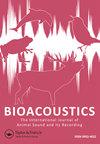Where, when, and why do western North Atlantic humpback whales begin to sing?
IF 2.1
4区 生物学
Q2 ZOOLOGY
Bioacoustics-The International Journal of Animal Sound and Its Recording
Pub Date : 2021-09-02
DOI:10.1080/09524622.2021.1972838
引用次数: 6
Abstract
ABSTRACT At the onset of the winter breeding season, male humpback whales begin a prominent breeding behaviour, singing. Early songs are produced on summer feeding grounds prior to migration, but little is known about the proximate cues for the initiation of this behaviour, nor where or when it begins. We document the phenology of humpback whale singing along the western North Atlantic coast ranging from Newfoundland and Labrador, Canada to Massachusetts, USA through the fall-winter of 2015–16 (seven stations) and 2016–17 (three stations). Acoustic data from static recorders were categorised as containing humpback whale non-song calls, song fragments, or full songs. First heard in September, singing occurred throughout the fall-winter, but was not regular until October. Latitude, temperature, photoperiod, sea surface pressure, and wind speed were considered as potential explanatory variables for four definitions of song onset using forward stepwise regression. Final models included the environmental variables with photoperiod negatively correlated to singing (coefficient = −657; p-value = 0.04). Reliable environmental cues, such as photoperiod, may produce a heritable physiological response, resulting in whales acquiring the capacity and motivation to sing, with the subsequent timing and nature of song production influenced by other factors.北大西洋西部座头鲸在哪里、什么时候、为什么开始唱歌?
摘要在冬季繁殖季节的开始,雄性座头鲸开始了一种突出的繁殖行为——唱歌。早期的歌曲是在迁徙前的夏季觅食地上产生的,但人们对这种行为开始的直接线索知之甚少,也不知道它在哪里或何时开始。我们记录了从加拿大纽芬兰和拉布拉多到美国马萨诸塞州的北大西洋西海岸座头鲸在2015-16年秋冬(7个站)和2016-17年秋冬(3个站)唱歌的现象。来自静态记录器的声学数据被分类为包含座头鲸的非歌声、歌声片段或完整的歌声。第一次听到是在9月,整个秋冬都在唱歌,但直到10月才有规律。使用正逐步回归,纬度、温度、光周期、海面压力和风速被认为是歌曲开始的四个定义的潜在解释变量。最终的模型包括光周期与歌唱呈负相关的环境变量(系数=−657;p值=0.04)。可靠的环境线索,如光周期,可能会产生可遗传的生理反应,导致鲸鱼获得歌唱的能力和动机,随后歌唱的时间和性质受到其他因素的影响。
本文章由计算机程序翻译,如有差异,请以英文原文为准。
求助全文
约1分钟内获得全文
求助全文
来源期刊
CiteScore
4.50
自引率
0.00%
发文量
25
审稿时长
>12 weeks
期刊介绍:
Bioacoustics primarily publishes high-quality original research papers and reviews on sound communication in birds, mammals, amphibians, reptiles, fish, insects and other invertebrates, including the following topics :
-Communication and related behaviour-
Sound production-
Hearing-
Ontogeny and learning-
Bioacoustics in taxonomy and systematics-
Impacts of noise-
Bioacoustics in environmental monitoring-
Identification techniques and applications-
Recording and analysis-
Equipment and techniques-
Ultrasound and infrasound-
Underwater sound-
Bioacoustical sound structures, patterns, variation and repertoires

 求助内容:
求助内容: 应助结果提醒方式:
应助结果提醒方式:


